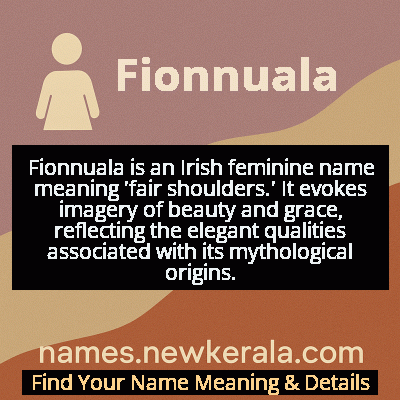Fionnuala Name Meaning & Details
Origin, Popularity, Numerology Analysis & Name Meaning of Fionnuala
Discover the origin, meaning, and cultural significance of the name FIONNUALA. Delve into its historical roots and explore the lasting impact it has had on communities and traditions.
Name
Fionnuala
Gender
Female
Origin
Irish
Lucky Number
3
Meaning of the Name - Fionnuala
Fionnuala is an Irish feminine name meaning 'fair shoulders.' It evokes imagery of beauty and grace, reflecting the elegant qualities associated with its mythological origins.
Fionnuala - Complete Numerology Analysis
Your Numerology Number
Based on Pythagorean Numerology System
Ruling Planet
Jupiter
Positive Nature
Optimistic, inspirational, and creative.
Negative Traits
Scattered, exaggerating.
Lucky Colours
Yellow, gold, purple.
Lucky Days
Thursday.
Lucky Stones
Yellow sapphire.
Harmony Numbers
1, 2, 9.
Best Suited Professions
Arts, writing, communication.
What People Like About You
Creativity, optimism.
Famous People Named Fionnuala
Fionnuala Flanagan
Actress
Award-winning Irish actress known for film, television, and stage performances
Fionnuala Britton
Athlete
Champion long-distance runner and European Cross Country title holder
Fionnuala Sherry
Musician
Violinist and Eurovision Song Contest winner with musical duo Secret Garden
Fionnuala Ní Aoláin
Academic/Lawyer
Distinguished legal scholar and United Nations Special Rapporteur
Name Variations & International Equivalents
Click on blue names to explore their detailed meanings. Gray names with will be available soon.
Cultural & Historical Significance
Extended Personality Analysis
Women named Fionnuala are typically associated with a blend of grace, strength, and protective instincts derived from their mythological namesake. They often exhibit natural leadership qualities combined with a nurturing disposition, making them both reliable in crisis and compassionate in everyday interactions. The legendary Fionnuala's role as guardian and guide to her brothers suggests personality traits of resilience, wisdom beyond years, and the ability to provide emotional support during challenging times. Many Fionnualas are perceived as having strong connections to their heritage and family, often displaying a quiet confidence that comes from deep-rooted values. They tend to be creative yet practical individuals who balance artistic sensibilities with grounded decision-making. The swan symbolism associated with the name contributes to perceptions of elegance, beauty, and the ability to navigate different social environments with poise. Typically, Fionnualas are thought to possess emotional intelligence that allows them to understand complex situations and people, making them excellent mediators and trusted confidantes.
Modern Usage & Popularity
In contemporary times, Fionnuala maintains a strong presence in Ireland and among Irish communities worldwide, though it remains relatively uncommon outside these contexts. The name has experienced consistent usage in Ireland, particularly among families seeking to preserve Gaelic naming traditions and cultural heritage. While it hasn't reached the international popularity of some Irish names, it's recognized and respected as authentically Irish. Recent decades have seen a revival of traditional Gaelic names, which has helped sustain Fionnuala's usage. The shortened form 'Nuala' is sometimes used independently, providing a more accessible option while maintaining the connection to the original name. In Northern Ireland, the name appears with moderate frequency, and among the Irish diaspora in countries like the United States, Canada, and Australia, it serves as a meaningful link to Irish identity. The name's mythological significance and beautiful sound continue to appeal to parents looking for names with depth, cultural resonance, and distinctive character.
Symbolic & Spiritual Meanings
Fionnuala carries rich symbolic meanings rooted in Irish mythology and cultural interpretation. The name symbolizes transformation and adaptability through its connection to the swan legend, representing the ability to maintain inner strength and identity despite external changes. The 900-year journey in the Children of Lir story makes Fionnuala emblematic of extraordinary endurance, patience, and the power of hope through prolonged adversity. As the protective older sister, she represents guardianship, familial loyalty, and the nurturing strength that guides others through difficult transitions. The swan imagery adds layers of symbolism including grace, beauty, and the connection between different realms - earth, water, and the spiritual. Fionnuala also symbolizes Irish cultural resilience and the preservation of heritage across generations, making her a metaphor for how cultural identity can survive and transform through historical challenges. The name embodies the idea that true strength often appears in gentle forms and that leadership can be expressed through protection and guidance rather than domination.

